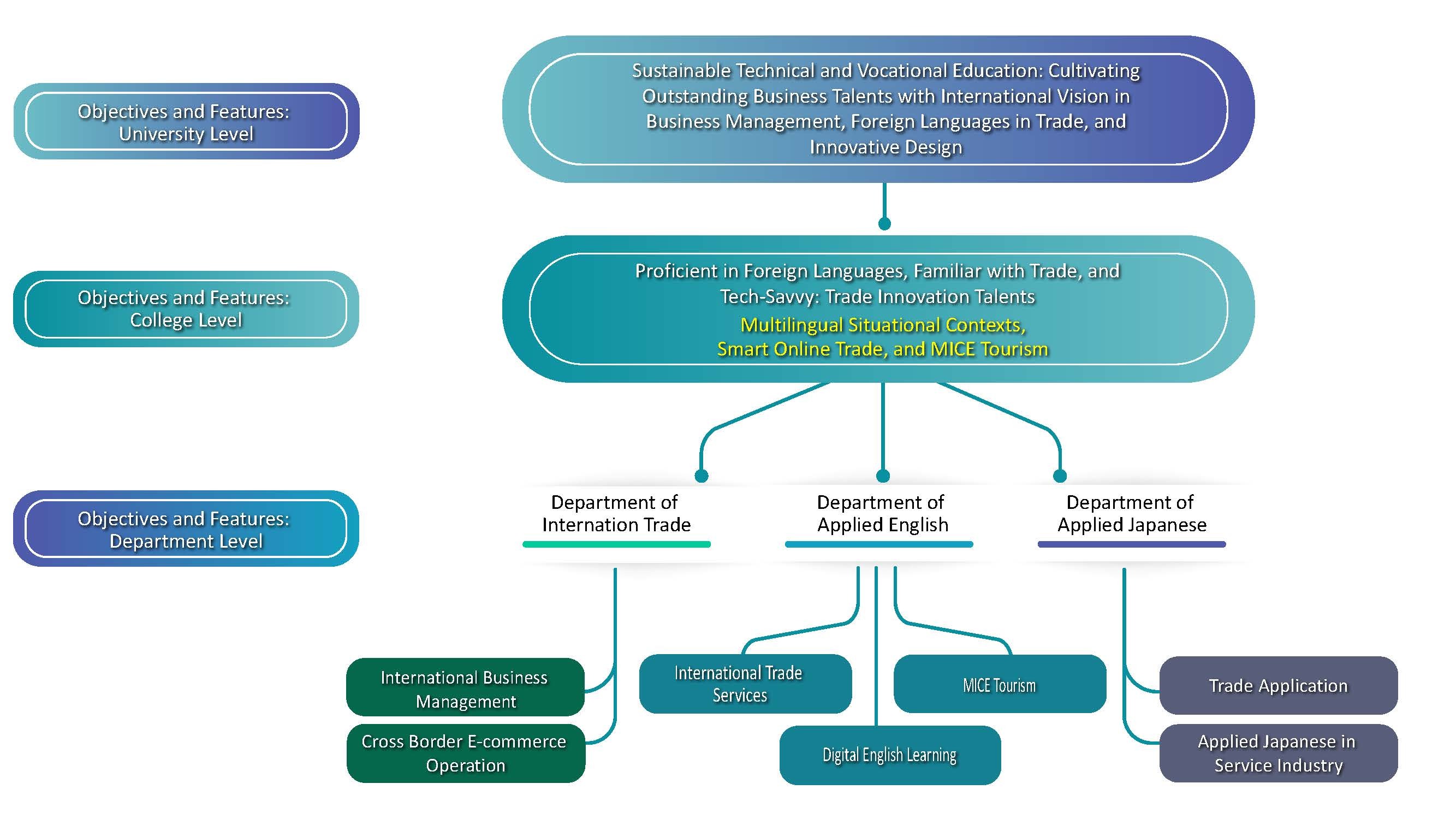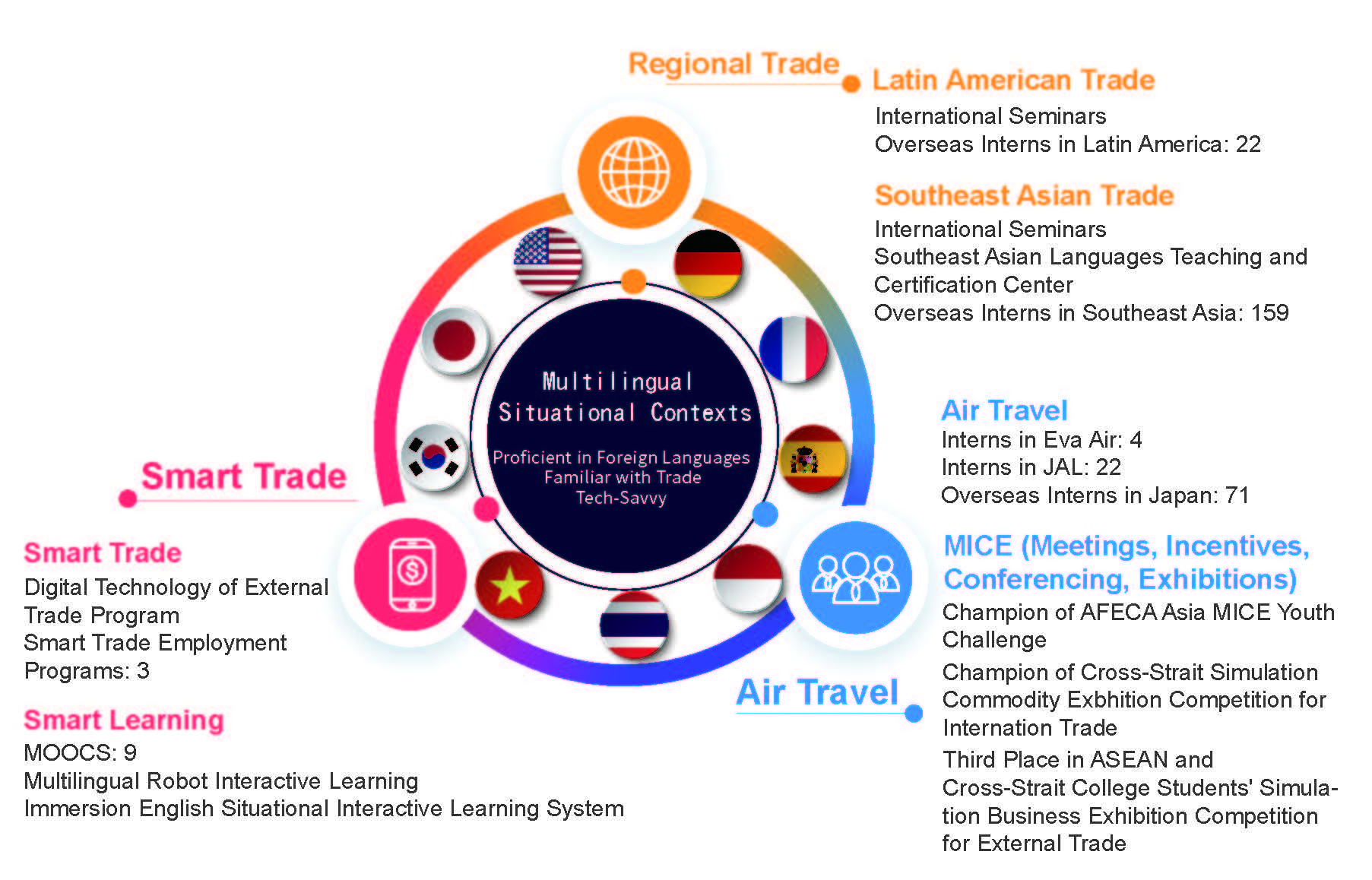College of International Business and Foreign Language
♦The College of Commerce and Foreign Languages
(I) Educational Objectives
The educational purpose of The College of Commerce and Foreign Languages is to cultivate students' international business literacy, communication ability, and global viability. Students' international business literacy is the core value of our college education, proficient foreign language ability is the tool of international communication, and sound psychological quality and adjustment ability are the necessary living ability of the future global society. Therefore, our college takes international business, language, and adjustment power as the three principal axes of our college nurturing education.
Sustainable innovation: "The College of Commerce and Foreign Languages is the favorite of enterprises with diversified context, international connection, and technology application characteristics." Therefore, the educational goal of the college is to develop all kinds of international business innovation talents who are proficient in foreign languages, familiar with the business, have a global outlook, good at cross-cultural business communication, able to adjust cross-border needs such as goods trade, service trade, knowledge trade, and cross-border employment. Educational objectives and fields are shown in figure。

Figure 1 Educational objectives and fields
(II) Planning the Key Areas of Professional Development in Line with the Educational Objectives
In line with the professional development emphasis on "Smart Business" and "Smart Life," the college focuses on innovative teaching advances in professional fields such as "Multilingual Situational Contexts," "Smart Online Trade," and "Air Travel.",shown in figure 2。
1. Multilingual Situational Contexts: Developing a multi-cultural context learning system, promote multilingual language testing, and cultivate students' business documents, language communication, and business briefing skills in English, Japanese, Korean, Spanish, French, Germany, Vietnamese, Thai and Indonesian.
2. Smart Online Trade: Developing the e-commerce education ecological learning system in stages, including the first stage of e-commerce enlightenment education, the second stage of cross-border e-commerce platform implementation education, and the third stage of training the marketing ability of smart online trade.
3. MICE and Tourism: Cultivating students to have a decent foundation of English and second foreign language ability, and have basic professional knowledge and practical ability such as conference and exhibition, tourism, transportation management, and air service.
4. Dual Degree:
Chihlee University of Technology + San Francisco State University (USA)--3+1+1 MBA Dual Degree
This dual degree program is designed for Chihlee students of business majors who have completed 3 years of university courses and wish to pursue an accelerated MBA degree at San Francisco State University. Pre-MBA program students will be admitted to SF State’s MBA Program on a conditional basis. To be eligible for this program, our students must demonstrate a minimum of GPA 2.5 and a TOEFL iBT 70 score. Upon successfully completing the program with an overall GPA of 3.5 or higher, passing an interview and a written test, our students will be admitted into the 1-year MBA with both TOEFL and GMAT waived. Chihlee students will need to receive the bachelor’s degree from our school when completing the Pre-MBA program in order to meet the minimum SF State graduate admission requirement.
Chihlee University of Technology + Middlesex University (UK)--3+1 BA Dual Degree
This dual degree program is designed for Chihlee students of business majors who have completed 3 years of university courses and wish to achieve BA in business administration at Middlesex University. Students will develop the essential business and administration skills to work across a wide range of private and public sector companies and gain the confidence to apply their knowledge across all disciplines in this combined program. To be eligible for this program, our students must demonstrate the required IELTS scores of 6.0 (with minimum 5.5 in all components).
♦Organization
- Our college includes the Department of International Trade (Master Program, Undergraduate Program, Five-year Junior College Program, and Night School Undergraduate Program), the Department of Applied English (Undergraduate Program, Five-year Junior College Program, and Night School Undergraduate Program), and the Department of Applied Japanese (Undergraduate Program, Five-year Junior College Program, and Night School Undergraduate Program). Three centers belong to our college: Industry-Academy Cooperation Center for Regional Trade, Center for Latin American Economy and Trade Studies, and Southeast Asian Languages Teaching and Certification Center.
- Industry-Academy Cooperation Center for Regional Trade: The main development direction is to collect and analyze business intelligence and investment information in China's central trade regions (such as Europe, America, Latin America, New South countries, etc.) with the concept of big data, and regularly issue research publications and hold relevant academic seminars and forums, to provide relevant information required by local manufacturers to develop foreign markets, assisting in promoting industry-academy cooperation, auxiliary examination of students' professional certificates, overseas study, internship, and practice. The connection of external resources is dominated by Taiwanese business associations around the world. At present, the letter of intent for cooperation has been signed by " Federation of Oversea Chinese Traders Alumni of Thailand," "Brunei Taiwan Chamber of Commerce," and "The Council of Taiwanese Chambers of Commerce In Vietnam."
- Center for Latin American Economy and Trade Studies: This center teaches in Chinese, English, and Spanish, integrating the study of Spanish and the introduction to Latin American culture in our program, regularly inviting all business representative offices of Latin American embassies in Taiwan, in which our government responsible for trade in the region and personnel engaged in work, investment, and business in Latin America to give lectures, teaching comprehensive knowledge of economic and trade integration and investment environment in Latin America. The external resources are mainly connected by the business representative offices of the Latin American Embassy in China. At present, the units actively negotiating and signing the letter of intent include the "Taiwanese Chamber of Commerce in Latin America" and "The Taiwanese Chamber of Commerce in Paraguay."
- Southeast Asian Languages Teaching and Certification Center: This center focuses on the cultivation of Southeast Asian language ability, combined with domestic and foreign Southeast Asian language-related production, government, university, and research resources, carrying out relevant teaching, research, and practical exchanges in the field of Southeast Asian language, so as to improve the essential ability of Southeast Asian language of our staff and students, to plan Southeast Asian language-related courses, developing appropriate practical teaching materials and plans, and to cooperate with Southeast Asian sister schools to handle the testing of Southeast Asian language ability.
Cultivating Outstanding Talents For Smart Business Innovation
1. The talent cultivation feature of our college is to develop international business talents with profound and diversified foreign language ability, business knowledge, humanistic cultivation, and global vision. The curriculum design meets the social needs of domestic and foreign trade, business, tourism, communication, translation, cross-cultural research, and English and Japanese teaching, and uses diversified, innovative teaching methods with enlightening teaching activities in order to effectively improve students' international business operation and foreign language communication skills.
2. In line with the professional development focus of "Smart Trade" and "Internationalization," the teaching characteristics of the college focus on the innovative teaching development of characteristic professional fields such as "Multilingual Situational Contexts," "Smart Online Trade" and "Air Travel".
(1) Multilingual Situational Contexts: Developing a multi-cultural context learning system, promoting multilingual language test verification and guidance, and cultivating students' business documents, language communication, and Business Briefing skills in English, Japanese, Korean, Spanish, French, Germany, Vietnamese, Thai, and Indonesia.
(2) Smart Online Trade: Forming alliances with associations and enterprises such as Chinese Non-Store Retailer Association, Importers and Exporters Association of Taipei, Alibaba.com Hong Kong Limited (Taiwan Branch), and developing e-commerce education and ecological learning system in stages, including the first stage of e-commerce education, the second stage of cross-border e-commerce platform implementation education. The third stage is to improve the marketing ability of smart online trade.
(3) Air Travel: Cultivating students to have a sound foundation of English and second foreign language, as well as basic professional knowledge and practical ability such as travel and transportation management and air service, and integrate with ground handling internships such as EVA Air and JAL Sky in Japan.
Figure 2 Key Areas of Professional Development
Building Smart Business and Smart Life Innovation Laboratory
Table 1 Teaching Facilities and Achievements of The College of Commerce and Foreign

Languages
| Departments | Innovative Business Model Laboratory | Photographs |
| Department of International Trade | Global Economic and Trade Application Laboratory |  |
| Smart Trade and Virtual Interactive Center |  |
|
| Cyber Celebrity and Commodity Studio |  |
|
| Department of Applied English | Creative Intelligence Collaborative Classroom |  |
| 3D Situational Interactive Intelligence Classroom |  |
|
| Language Self-Study Classroom |  |
|
| Department of Applied Japanese | Japan Trade Cross-Domain Laboratory |  |
| Cloud Multi-Functional Classroom |  |
|
| Japanese Culture Classroom |  |








